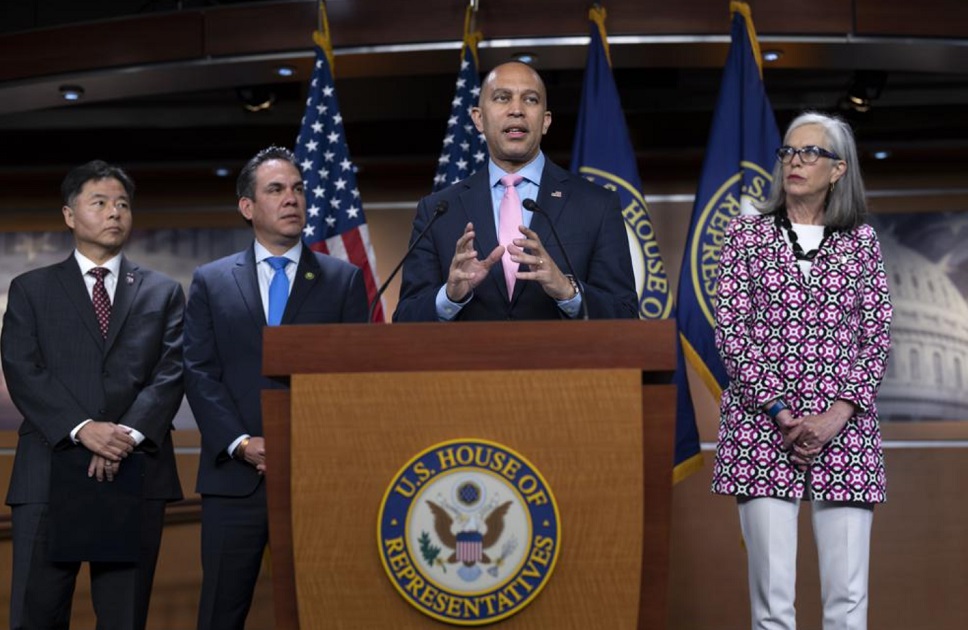
WASHINGTON—If the budget deal had not been negotiated at the same time as the bill to lift the debt ceiling the budget would have to have been negotiated this fall and would probably have ended up looking much like the one sealed in the House vote last night.
Rep. Ocasio Cortez, Democrat of New York, put it best perhaps when she described it as a “center-right thing” full of items we oppose, especially additional work requirements for poor people already suffering. It’s their bill,” she said of the Republicans, “so let them muster the votes to pass it.”
In the end, the Republicans could not get more than 149 votes to pass the bill resulting from their holding hostage the president of the U.S. and the American people in order to bring it to the floor. Democrats, including many who opposed the concessions to the right, had to bail them out and provide the difference in order to get to 218 and prevent a catastrophic default of the national debt which would have decimated the working class and all its allies.
The vote in the House last night was not, as many talking heads on MSNBC and elsewhere are saying, a “rejection of both the right and left extremes and a strong holding by the center.” It was, in fact, a defeat for the extreme right, a display that Republicans as a whole have gained little in terms of legislating ability by catering to them and a display that progressives, including life-long supporters of the causes of the people, were determined to fight for their issues and simultaneously save the country from the catastrophic default the extreme right would have capitalized upon.
Seek a complete takeover
The 314-117 vote came after the radical right Freedom Caucus made clear their aim was to complete their takeover of the Republican Party and deliberately attack the still-frayed social safety net millions of people depend upon. Although the end result was the center-right “compromise” branded as such by AOC, the catastrophic default was averted and major pieces of the progressive agenda of the last two years were preserved, despite the concessions that the administration’s supporters say it had been forced to make.
The measure, HR3746, now goes to the Senate, which has until June 5 to act.
No one should think that the attempt to use the debt ceiling debate to force into effect parts of their agenda is the end of their right-wing push. House Speaker Kevin McCarthy, R-Calif., openly admitted, “It’s not the solution. It’s the beginning,” as he told his colleagues near the end of debate.
McCarthy struck the bargain with Democratic President Joe Biden, to impose cuts in return for raising the U.S. debt limit, which covers past spending and anticipates future spending, too.
But on a key preliminary vote, 29 Republican MAGAites defected. Democrats had to bail McCarthy out. On the final vote, 71 Republicans defected, as did 46 Democrats, all of them angry progressives. But more Democrats (165) followed Biden than Republicans (149) followed McCarthy.
The cost is cuts in domestic spending and imposition of work requirements on food stamps and Temporary Assistance to Needy Family clients, among other right-wing goals. The military got more money, as Biden sought.
“Speaker after speaker has denied food to poor old women who are Black and brown…Hypocrisy, thy name is GOP,” said Rep. Gwen Moore, D-Wis., who represents inner-city Milwaukee.
“’ There are only two things, Mr. President,’” McCarthy bragged to his colleagues about his first talk with Biden. “’Never raise taxes. And spend less than we have this year.’” McCarthy said later: “We rejected every single one of Biden’s tax demands.”
That rejection didn’t satisfy the radical right or—lurking in the background—their corporate class of campaign contributors, such as the National Association of Manufacturers, which one Republican cited. Demagoguery continued, on the House floor and in a right-wing Freedom Caucus press conference before it.
The Freedom Caucus demanded deep cuts—22% or more—in domestic spending. One caucus member planned to zero out OSHA, but House debate rules barred his amendment was barred, and all others.
“This bill is a bunch of fake news and fake talking points,” said radical right Rep. Lauren Brobert, R-Colo., at that Freedom Caucus press conference the morning of May 31. She didn’t say why. “This is the very thing we campaigned to put an end to.” Fellow MAGAite Rep. Andy Biggs, R-Ariz., called the measure “ephemeral and malodorous.”
“House Democrats were very clear we would not let MAGA Republicans crash the economy or default on our debt,” retorted Minority Leader Hakeem Jeffries, D-N.Y., in a floor speech. “We will continue to push back against the extremism on the other side of the aisle.” He voted for the deal.
Unhappy with the deal
Progressives, of course, were unhappy with the deal. Progressive Caucus Chair Pramilla Jayapal, D-Wash., upset over Biden’s failure to raise taxes on the rich and corporations—and his failure to gain repeal of the 2017 Trump-GOP tax cut—voted “no.”
“Republicans have no interest in cutting the deficit,” Jayapal said. “Their focus is on cutting taxes for their wealthiest benefactors: Big corporations and billionaires who finance their campaigns. And they want YOU—working people across the country—to foot the bill.
“The Progressive Caucus is here to sound the alarm about the harm coming for the working families if Republicans are successful. Please understand: None of this is normal,” she said. And Jeffries reminded the Republicans that their tax cut under Donald Trump was totally unpaid for. He added, “83% of the benefits went to the wealthiest 1%, to subsidize the wealthy, the well-off, and the well-connected.”
Influential progressive Rep. Ro Khanna, D-Calif., voted “no,” too. “Republicans would rather line the pockets of defense contractors at the Pentagon than help Americans keep food on the table. That’s the sad truth,” he said in a tweet. In his own floor speech, Khanna said the measure “will cause millions of Americans to suffer so Republicans can score political points.
“I cannot support taking away food stamps from older Americans, including disproportionately women of color, forsaking students with mountains of debt, and sacrificing our water and our air to fast-track the Mountain Valley Pipeline–a project completely unrelated to the national debt.
“It’s cruel, and the work requirements and environmental harms won’t meaningfully move the needle on the deficit,” he added. Khanna also noted the deal not only keeps the Trump tax cuts but eliminates 25% of the extra money, allotted last year, that would go to the IRS to catch corporate and rich tax cheats.
“If Republicans are serious about reducing the deficit, they should start with the Pentagon budget, which is approaching a trillion dollars a year, and end Trump’s tax cuts for the rich. This is not a deal that upholds progressive values. It increases spending for defense and limits the pot of money for everything else.” Added Rep. Bill Pascrell, D-N.J., “We will need to fix our tax system. It is not fair.”
Rep. Lloyd Doggett, D-Texas, summed up the tradeoff: “Ransom paid, America protected.” The ransom was the cuts, the protection was the debt limit hike.
The cuts included imposing more work requirements on people who receive food stamps and Temporary Assistance for Needy Families, re-imposing student debt payments, starting this fall, and rolling back domestic spending to fiscal 2022 levels i.e. spending as of last September 30, followed by a two-year spending freeze and 1% yearly increases after that.
“I’m thinking of my constituents who might lose their food stamp benefits. I’m thinking of older women of color who don’t have any lobbyists. They only have me,” said a torn Rep. Jahana Hayes, D-Conn., a National Education Association member and former National Teacher of the Year.
The bill also forces Biden to cost out his executive orders, potentially freezing them, too. He’s been using the orders to impose policies, such as student debt forgiveness, he knows the GOP would block.
Nevertheless, “We have protected Medicare. We protected Social Security,” along with Medicaid and veterans’ benefits, declared Rep. Richard Neal, D-Mass. “In December 2017, the Republicans borrowed $2.3 trillion to provide a tax cut for the rich which the rich didn’t even ask for…Let’s not forget who put us in this situation. In the last 20 years, they voted for $10 trillion in tax cuts” for the rich.
We hope you appreciated this article. At People’s World, we believe news and information should be free and accessible to all, but we need your help. Our journalism is free of corporate influence and paywalls because we are totally reader-supported. Only you, our readers and supporters, make this possible. If you enjoy reading People’s World and the stories we bring you, please support our work by donating or becoming a monthly sustainer today. Thank you!













Comments